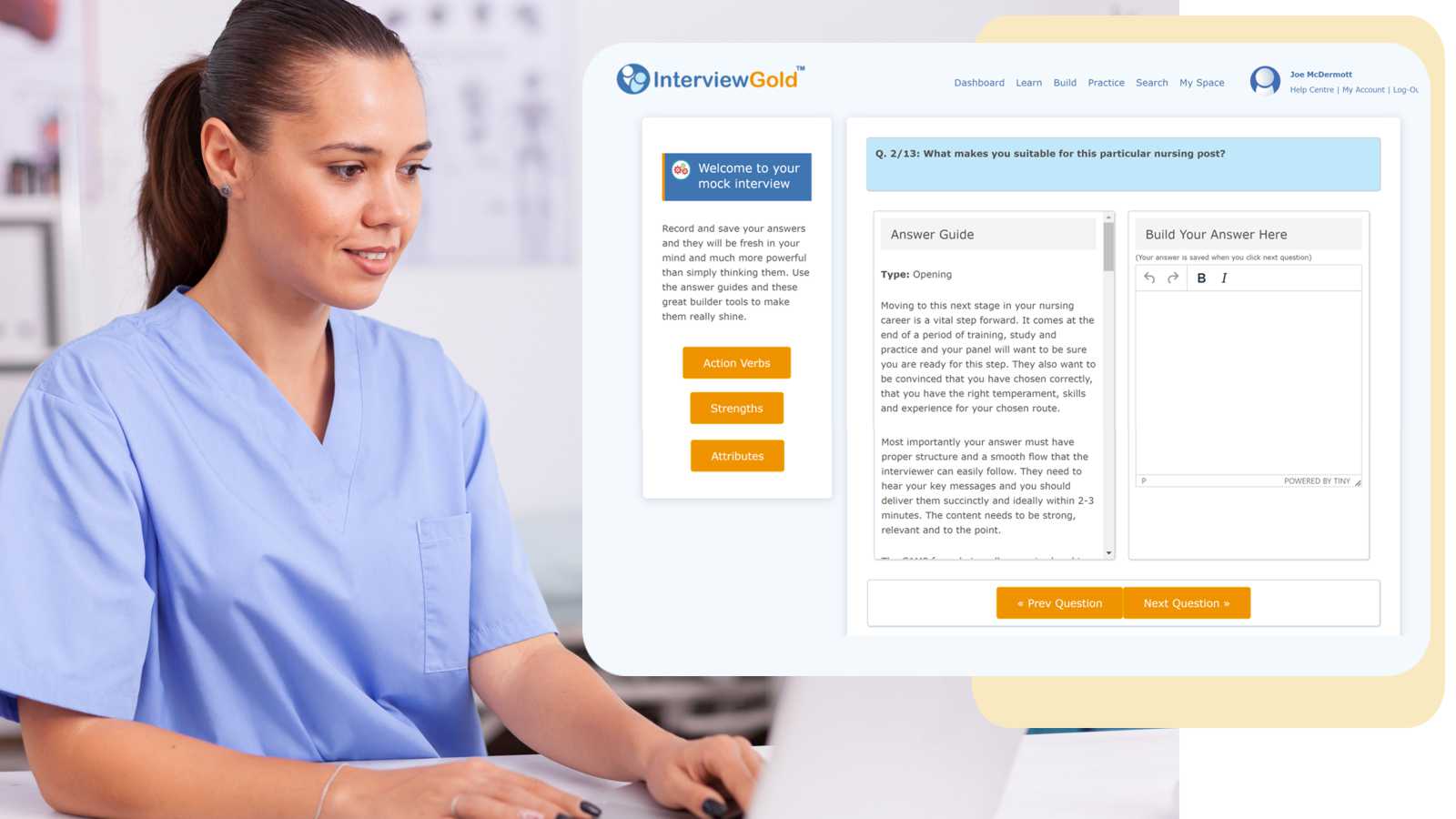
Have you got a nursing interview coming up during 2024? Ready to take that next step up in your career?
Maybe you are starting your nursing career and want to know what to expect in your interview? Perhaps you are moving up in your career and looking for accurate interview questions. Or maybe you would like advice how to how to answer successfully to get the job?
Looking for interview questions for band 5, 6, 7, 8? Well, you have come to the right place.
I have recruited for many nursing and healthcare positions in the UK both in the NHS and in private. I have created interviews for jobs ranging from healthcare and nursing assistants, staff nurses at all grades, practice nurses, district and community nurses and nurse team leaders and managers.
I am aware that for many nurses, the interview can be a daunting prospect and in fact, the fear of interviews puts many off moving to different trust or applying for a new job. Sadly, they miss out on potentially great promotions, increased salary, and more interesting roles and this need not be the case.
This detailed article includes a guide to the types of interview questions for bands 5, 6, 7 and 8 and I detail what to expect in NHS nursing job interviews this year.
In this article:
Band 5 Interview Questions, Answers & Tips

Having completed your nursing degree or course approved by the Nursing and Midwifery Council (NMC) and once qualified and registered with the NMC you can now apply for nursing posts most usually at band 5. These are usually within one of four areas: adult nursing, child nursing, mental health or learning disabilities and of course within these areas there are a range of specialties.
Band 5 job titles examples include:
- Staff nurse band 5
- Community nurse band 5
- Registered nurse band 5
- Staff nurse – Endoscopy Band 5
- Neonatal Staff Nurse Band 5
- Staff Nurse, Band 5 A&E
Nursing band 5 interview – what to expect
Once you have passed the initial shortlisting, you should receive an update and an invitation to interview.
You will take part in a formal interview, which may take place the same day or at a later day agreed by you. Your interview will most likely be in front of a panel, with a minimum of 2 people.
Expect a blended interview with a combination of questions including:
- Interview questions exploring experience, skills and training
- Motivation and reasons for applying
- Clinical, ethical and scenario based questions
- Competency based questions
- Values based interview questions and
- Knowledge of NHS topics and issues
Keep in mind that you may also be required to take part in online tests specifically:
Literacy Tests: Your literacy test may be based on a patient scenario and you will be asked to document the actions you would take.
Numeracy Test: At band 5 the maths tests usually involve drugs calculations. The questions are usually relatively easy and may ask you to convert or calculate quantities or work out how long it takes for a drug to deliver.
For example, here are some typical maths-based band 5 interview questions:
Question 1: How long would it take for a litre of IV fluids to deliver at a rate of 150ml/hr?
Answer: The answer would be 6.66 hours or 6 hrs and 40 minutes.
Question 2: If you had 0.85ml of medicine in one syringe, 5.36ml of medicine in another syringe and 8.02ml of medicine in another syringe how many ml of medicine will you have in total?
Answer: 14.23ml
Question 3: Your patient weights 68.5kg and is prescribed Dopamine at 0.2mg/kg/day. What is the total amount of dopamine they will need?
Answer: 13.7mg
Band 5 interview questions examples
- What personal qualities do you bring which makes you an effective band 5 nurse?
- Give us an example of a skill you have acquired recently which will be of use within this band 5 post.
- Talk us through a challenging patient scenario you managed and how the outcome helped with your development as a nurse.
- Can you briefly talk me through your understanding of Safeguarding in a Nursing environment.
- Describe a time when you felt you gave optimum care to your patient. What did you do that made the experience so good for your patient?
- You have made a mistake when treating a patient. What do you do?
- Give us a recent example which shows your ability to communicate challenging information to a patient or their family.
- What guidelines and procedures would you follow regarding urinary catheter maintenance in order to prevent urinary tract infection (UTI)?
- How would you say the 6Cs have improved the level of care you give?
- Why have you chosen nursing as your career?
- Tell us about your ability to work as part of a multi-disciplinary team.
- What are you career goals within nursing?
- What aspects of nursing in this specialty do you find most challenging?
Top Tips – How to Answer Two Common Band 5 Questions
Tell us about a time when you showed true compassion when dealing with a patient.
Following on from question 2 you may be tested with scenario-based questions selectively for example this one relates to compassion. A recent experience is best one which shows your ability to bring compassion to a situation perhaps dealing with a patient and or their family.
For these types of questions, you will need to use the STAR or IPAR formula to structure your answers and your example will need to be clear and strong enough to demonstrate the quality you are being asked about.
What is your understanding of the 6Cs in nursing?
When looking to be a nurse, you need to demonstrate you possess the six Cs of nursing values, care, compassion, courage, communication, commitment, and competence
When shaping your answers to interview questions in your nursing interview, try coming back to these ideas time and again.
Depending on your level they may ask a more general question such as ‘Which of the 6Cs do you deem is most important?’ When giving an answer you must mention the equal importance of all however you can then give an example of when you demonstrated them in your work with emphasis on perhaps 2 or 3 in particular.
See how you will succeed in your band 5 interview with InterviewGold
Band 6 Interview Questions, Answers & Tips

This is a unique time to be part of the nursing profession. Due to shortages in nurses, the Government are targeting a recruitment of a total of 50,000 extra nurses and have been offering £5,000 a year to train to enter the profession. In addition, for those wishing to progress up to band 6 there are many opportunities.
As a band 6 nurse, your role will be more specialised and you may choose to apply for a post in a specific area or practice.
Band 6 job titles examples include:
- Senior or Specialist Staff Nurse
- Ward or Deputy Manager
- Specialist Nurse Practitioner
- Team Leader
- Posts may be in areas such as within theatre, ICU, district nursing or paediatrics.
Getting that step up to band 6 will require not just the right experience and skills, you will also need to show in your application and interview that you are ready to take this next step.
On average, I would expect to see that you have completed sufficient time within band 5, that you have gathered key skills both clinical and what I call softer skills such as the ability to communicate effectively with patients and others.
Ideally, I would advise at least 12 to 18 months in a previous role ’s experience before applying to band 6. Also, I would expect to see that you have completed recent and relevant specialist training connected with the area you are keen to enter.
Nursing band 6 interview – what to expect
For senior posts at band 6 your interview will be more in depth with questions exploring not just your ability to give great patient care but also to lead a team and manage resources.
As you are progressing into a band 6 post, they will be interested in exploring your ability to support the senior team, to work as a team player and to lead junior nurses and trainees.
They will test your ability to manage the ward in the absence of the manager and so you will need to refresh your memory of tasks where you have shown leadership, initiative and excellent decision making, not just in terms of clinical situations but also when dealing with colleagues or with patients and their families.
Interview questions for band 6 posts will assess your ability to lead and mentor and carry out associated duties such as:
- recruiting and developing nursing staff
- overseeing induction and training programmes
- implementing staff development initiatives
- carrying out appraisals
- dealing with disciplinary and performance issues
Band 6 Interview Presentation
Depending on the role you may be asked to give a presentation. This can range from 10 -20 minutes and you may be asked questions afterwards.
You will of course be told in advance however common topics include:
- What are the key differences between Senior band 5 and Band 6, and how would you measure your success in these key areas.
- As a band 6 nurse, how would you promote teamwork and feelings of pride and give examples of how you have done this in your current role.
- Give a short presentation about yourself and why you are suitable for this band 6 post.
Sample band 6 interview questions
In addition to the question types mentioned above you should expect many of your band 6 interview questions to be competency based and behavioural based asking for specific examples or scenarios. For example, how would you answer these band 6 interview questions?
- Talk us through your reasons for applying for this band 6 post.
- What have you learned in the past 12 months which makes you a suitable candidate for this band 6 position?
- Walk us through your recent career and highlight relevant training and experience which will be useful to you in this band 6 post.
- Talk us through an example which demonstrates your ability to deal effectively with emergency situations.
- Describe a time when you used your communication skills to improve the care of one of your patients.
- Describe for us a time when you used your leadership skills to resolve a difficult patient situation.
- Tell us about a change you made to your working practices in order to improve patient safety.
- How would you go about ensuring that you improve the quality of the care you give to your patients?
- Tell us about a decision you made recently which had a positive effect on your patient’s care.
- How would you show courage in your daily rounds.
- Give us a recent example.What would you do if you suspected your patient was being abused?
- Describe how you use reflective practice in your daily work.
- As a senior nurse, what strategies would you implement to ensure your team were following correct infection control and prevention procedures?
- What tools do you use to ensure you communicate effectively with your patients and others?
Top Tips – How to Answer These Two Common Band 6 Questions
Questions 1: The “Tell me about yourself” question in a Nursing Band 6 Interview
This is our number 1 question, not just for nursing but all posts. So, if it comes up for example as one of your band 6 interview questions here is a tip to help with answering.
Having one standard answer to this question for all nursing posts won’t serve you well. It would be best to adapt what you say to what you know the interviewer is looking for, and their values and pain points will shape this. It will also be clear in the person specification.
Avoid general statements and fix everything in specific examples and stories from your experience when answering the question. Ensure this experience is relevant to the nursing speciality you are applying to.
Keep focused on answering this question about yourself regarding how your character helps you be the best nurse possible. Be honest and transparent about your nursing experience in its challenging moments and how you have risen to these times.
Question 2: How do you expect proposed changes will impact on your ability to provide quality care?
Remember there may be questions certainly from Band 6 and above regarding NHS Hot Topics, for example, Mental Health issues, Funding, the Charlie Gard case.
Less likely, you may even be asked about older issues and how they continue affecting your daily care such as the Francis report. So while rare it is worth spending a little time on these hot topics even those which now seem out of date but may still be part of your nursing protocols.
You must keep your knowledge and skills up to date and you will be asked questions related to the 6Cs and NHS Hot Topics.
How InterviewGold will help you get your band 6 post
Band 7 Interview Questions, Answers & Tips

Nursing is a unique profession, and the level of responsibility taken on by a senior nurse is often under-estimated. The banding of nurses allows for those capable of rising to levels of much greater degrees of accountability. At Band 7 and 8, the interview and the questions you are asked are much different to those at lower bands, reflecting these higher-level responsibilities.
Band 7 job titles can include:
- Lead Nurses Band 7
- Ward Managers Band 7
- Senior Nurse Practitioners Band 7
- Clinical Specialists Band 7
At Band 7, you are expected to undertake the responsibilities of advanced leadership. It might, for example, mean you are taking on a ward manager post. You will be expected to show competencies in managing other colleagues and patient movements and coordination with the Bed Manager.
The leap in responsibility from a Band 6 to a Band 7 is significant, and some support and guidance in developing the leadership qualities are useful.
Here we explore the questions you might be asked and some guidance on how to shape your answer.
Band 7 Interview Questions and Answers
Here is a small sample of band 7 nurse interview questions with a short answer guide. How would you answer.
1. What management experience do you have for a Band 7 nurse?
When applying for the post, you will be given a list of competencies you will be expected to fulfill in this Band 7 role. Be sure to cite specific examples of experience that relate to these criteria.
2. What have you done to improve your knowledge in the last year?
When you reach a position of leadership, it is easy to become complacent about your skill levels. If this question is asked, your employer shows that they understand constant, positive self-improvement is a necessary quality in a nurse. Demonstrate how you take on additional learning to ensure you stay up to date. Your goal in your answer is to prove you are self-sufficient and motivated.
3. Moving up to a Band 7 post can highlight gaps in ability. What would you need to improve on to take on the role successfully?
This question is asking about a weakness and there are two ways you can address this. You can take a weakness that just happens to be your greatest strength now. Alternatively, you can point to something you are aware of about yourself and how you actively work to improve or counter this weakness. The latter option is much more authentic to the question being asked.
4. Why have you decided to apply for this specific position, and what value can you offer?
Remember, the step up from Band 6 to 7 is usually substantial, and your new role will be different to what you have done before. Therefore, the employer is trying to gauge if you understand what is expected of you and how you can fulfil the responsibility. Talk about your motivations and reflect in this your understanding of what you will be doing.
5. Provide an example of when you have had to convince a challenging service partner and describe how you influenced them.
When you reach this level in nursing, you will be responsible to some degree for clinical and operational delivery. This means you will be part of negotiations with others who will have competing needs, values, or ideas. You will need to use phrases such as active listening, seeking compromise, empathising, and getting buy-in.
6. How have you dealt with the under-performance of another staff member?
The answer to this question depends on whether the under-performance is clinical or whether it is to do with teamwork and general competencies. If lapses in clinical knowledge are serious, then you are compelled to explore formal disciplinary procedures. If the under-performance supports the team, it might be better to talk about support and mentorship to evolve them as a professional.
7. Provide an example of a project or program you have led.
While at Band 6, you might not have had extensive leadership or management; you are likely to have taken on some responsibility for projects or programs. Prepare ideas on how you performed in these projects and how you will apply what you learned.
Get Band 7 Interview Questions with Expert Answers with InterviewGold
Band 8 Interview Questions, Answers & Tips

Moving to a Band 8 post is an exciting opportunity and you will need to show that you are ready to take on the extra responsibilities. You may still carry out some nursing duties, but you are more likely to manage a large team of staff.
Your management skills at this level are essential to your success, and the bigger the team, the more this will be reflected in your salary. Band 8a – 8b roles begin at close to £46k and can rise to almost £88k per annum.
Sample Band 8 Interview Questions and Answers
Here is a small sample of generic Band 8 interview questions. Your answers will need to reflect the greater level of responsibility you are taking on.
1. What type of leader are you, and how would you demonstrate effective leadership?
You are expected to carry out your everyday nursing duties while showing effective leadership skills. Recognising that this can create a conflict for your time and how you manage this. It shows you have a realistic expectation of what awaits you. You should also give a clearly defined idea of your version of effective leadership, likely focused on applying exceptional standards for which you will be a positive role model.
2. When did something not go your way, and how did you handle the situation?
The interviewer is basically asking if you are aware of how difficult a Band 8 nursing job is going to be. It is a challenging role, and they want you to enter the position with your eyes wide open. How you react will be essential, understanding that you put the organisation as a whole before your needs and opinions. You may want to reference the NHS values and offer a specific example of when these were challenged.
3. How would you demonstrate the NHS values in this Band 8 position?
Within a leadership role in the NHS, you are expected to uphold the core values of the service and your Trust. How you do this is going to define how successful you are as a Band 8 nurse. Start by naming the values to show how you know them, and then give specific examples of how you will promote these values.
4. What would you do to improve the service we provide for patients?
You will have influence over decision making in the Trust and so will be expected to show some strategic thinking. Consider what improvements you would make and how you would deliver these changes for the Trust you are applying to, making sure you consider implementation and impact.
5. What are the principles of change management in the NHS?
Managing change in any context is challenging, as you run up against the values and beliefs of those who have worked in a set way for a long time. In the NHS, managing change has to be done with exceptional efficiency if it does not impact patient care. Understanding some of the theories of change management and then shaping this theory to the context of an NHS trust will provide all you need for an excellent answer.
6. What’s the most important characteristic needed for this Band 8 position?
By the time you reach a Band 8 position, your technical skills as a nurse are likely beyond reproach. What might be put under pressure is your character, as you are faced with the daunting challenge of managing the care of patients and the performance of colleagues. Consider what character you have and why this makes you perfectly suited to this level of challenge.
As a candidate you will be expected to be more active in your interview. You may be asked to give a presentation to demonstrate your communication skills. Competency questions relating to leadership, communication, changing and improving may be asked and your examples will need to reflect the level this role is at.
At all levels, it is always a good idea to have some questions ready to ask the panel. Yet, when you get to Band 8, you are expected to interview the employer as much as they are interviewing you. When you reach this level, you need confidence in your suitability to the degree you want them to fight a little for your time. So, asking what makes this trust or department different, finding out something about the organisational culture and asking what supervision and professional you will enjoy are all valid questions to ask.
Get Band 8+ Interview Questions with Expert Answers
Nursing Interview Questions NHS Hot Topics
So, what types of interview interviews should you expect in your nursing interview?
If you are being interviewed within the NHS today, you will more than likely be asked to take part in a formal interview in front of a panel. Due to Covid-19 your interview will be held within safety guidelines and may be conducted online.
Your interview questions will be a combination of traditional and competency-based in the form of a blended interview exploring your skills, qualifications and experience.
Nursing interview questions will normally follow the job description and person specification relevant to your band and the main categories are:
NHS Values Based Interview Questions
Values Based Recruitment (VBR) is a key framework used within the NHS and is designed to attract employees whose values match those of the organisation. You may be assessed in a number of ways including via a pre-screening values questionnaire which you would complete before you make your application. On the application and within the interview, you may be asked values based questions which are similar to competency based questions exploring your behaviour in past scenarios.
Core Competencies and Behaviours
The person specification will outline the essential criteria required and these competency-based interview questions will be designed to see whether you have the key skills and aptitudes required. Expect questions exploring the following:
- Communication Skills
- Leadership
- Developing Self and Others (Personal and People Development)
- Health, Safety and Security
- Changing and Improving (Service Improvement)
- Equality and Diversity
- Decision Making and Problem Solving
- Quality Care
- Teamwork
NHS Knowledge and Skills Framework KSF
You will be required to meet the requirements of the KSF and questions will be directed towards the key elements.
Clinical Questions
While clinical skills are normally explored via written tests, you may find they ask some during the formal interview too. These may be hypothetical or direct. Here is an example of both:
Q. On your rounds you notice that one of the newer staff nurses in your change has incorrectly administered medication to the patient. What action would you take?
Q. What do you know about the sepsis six bundle?
We generally find that clinical questions are covered in some form of test pre-interview. Having said that they may put you on the spot in the interview. However, we find that most candidates can answer these clinical questions easily as they will relate to the day to day care being provided.
Professional Values and Ethical Questions
Expect interview questions exploring your ability to adhere to the NMC Code of conduct. These can be in the form of scenario based or competency-based questions and to prepare you should download and read the updated code which is available from the NMC website here.
Previous Experience
The interviewer will ask questions based on your experience as shown on your CV. For example, interview questions for Band 6 and above will explore your ability to manage a team, delegate tasks and take on greater responsibility.
Training and Qualifications (CPD)
In this category you should expect interview questions exploring your understanding of governance, clinical effectiveness, NHS and Trust targets as well as your ability to keep your skills and knowledge up to date.
Personality, Motivation and Coping Skills
Your reasons for applying or for choosing your area of specialisation and how well you deal with difficult situations such as the death of one of your patients.
Key Areas and Hot Topics
The following four areas are key right now and you should expect questions exploring your understanding and your ability to apply guidelines in your daily practice.
- Covid-19 (Coronavirus)
- Infection Prevention and Control
- Duty of Candour
- Mental Health Services
- Health and Safety
- Equality and Diversity
- Safeguarding
- And many more
In any one interview, I would expect about 12 questions or so. As you can imagine, they cannot explore all of the areas above hence some will be covered by the written test.
How to prepare for your nursing interview – Top tips for band 5, 6, 7 and 8
In nursing, as in most professions, proper preparation is vital to getting the job and here are some top tips to get you ready.
Know the Trust, Department, Hospital
Many interview invites will encourage you to visit the place in which you will be working and to meet some of the team. This is a great way to show motivation and interest although it is not always physically possible to do so. Online research of the Trust or hospital will reveal its values and mission. In addition, there will also be issues problems that they are looking to overcome and this can hep shape your answers especially for the more senior posts. If you can speak to these in an interview, you are likely to interest them.
Review the job description & person specification
This is key and you must study this in depth and be familiar with the core responsibilities. These can include planning the delivery of patient care and taking responsibility for implementing and evaluating that care, using an appropriate nursing model. You will also be required to provide advice and support to patients, staff and junior colleagues. Communication is key and you will be expected to develop communication networks throughout the multidisciplinary team.
Refresh your nursing career to date and be clear about your goals
In advance of the interview, review your CV, the areas you have worked and what you have learned. Refresh your memory of challenging patient scenarios both successful and those that didn’t go as well as hoped.
Research the values of the Trust and the NHS
In nursing, as in most professions, the trust or hospital you hope to work within will have its values and mission. They will also expect you to show that your values align with the NHS and understand the current issues and demands on the service. In addition, I suggest you are 100% on top of what is happening in the NHS. Recent years have been a momentous time in the medical sector, and you will need to show an awareness of these issues and how they impact your new role.
Know yourself, understand your own abilities and what you bring
The interview panel will be assessing your character and your suitability for the role. They are looking for someone who can bring the skills required and perform excellently. Drawing upon your past experience is key, so prepare and rehearse answers to scenario and competency questions. These will be situations where you have shown an ability to communicate, to listen, to provide great care, to lead and inspire for example.
Succeed in Your Nursing Interview


